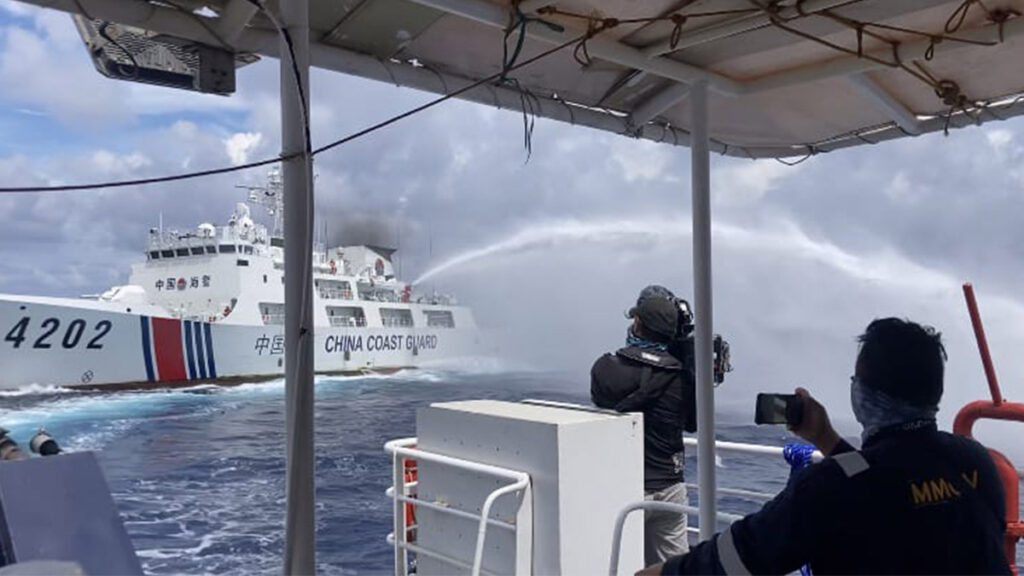Brawner happy about US’ help in West Philippine Sea ops

WATER ATTACK A China Coast Guard ship fires its water cannon at BRP Datu Sanday while the Bureau of Fisheries and Aquatic Resources’ vessel is on its way to Escoda (Sabina) Shoal in the West Philippine Sea on Sunday. —File photo from NESTOR CORRALES
BAGUIO CITY, Philippines (Updated) — Washington’s offer of assistance for the rotation and resupply mission of Manila in the West Philippine Sea is welcome, but the latter should rely on itself first.
General Romeo Brawner, chief of the Armed Forces of the Philippines (AFP), made the remark on Thursday during a press conference with US Indo-Pacific Command chief Adm. Samuel Paparo Jr here at the Philippine Military Academy.
“We’re happy that the United States has given us a lot of options, including that of joining or escorting us for the voyage,” Brawner said in a press conference after the meeting of the Mutual Defense Board–Security Engagement Board (MDB-SEB).
“But as I said earlier, we are going to do the mission unilaterally,” he maintained.
Brawner stressed that the AFP is “very much capable” of doing the Rore “safely and successfully.”
“We will depend on ourselves first and we will try to exhaust all the options first before asking for help,” Brawner said. “After we exhaust all the options and nothing works, then, that’s the time we can ask for help.”
When pressed on what incident would prompt the country from seeking US assistance in Rore, Brawner painted a grim picture.
“So when our troops are already hungry, they don’t have any supplies anymore because our resupply missions have been blocked and that they’re on the verge of dying, then that’s the time we’re going to seek the help of the United States,” he said.
Joint Rore under MDT purview
The AFP chief made this remark as Paparo on Tuesday said that US ships providing escort to Philippine vessels on resupply missions in the WPS is “an entirely reasonable option within our Mutual Defense Treaty (MDT).”
“My job is to prepare options if so called, and number two, I’m an instrument of those options,” Paparo said
The MDT is a treaty between Manila and Washington that calls for each other’s defense in case of an armed attack.
Articles IV and V of the MDT state that an armed attack in the Pacific, including anywhere in the South China Sea, on either of Manila and Washington’s public vessels, aircraft, or armed forces, including their coast guards, would invoke mutual defense commitments.
However, the term “armed attack” was not clearly defined in the treaty.
Paparo noted that the term “armed attack” is “a diplomatic definition but not necessarily a legal definition.”
Nevertheless, Paparo said the US is ready to extend assistance on the Rore.
“We stand ready,” he said. “It’s a matter of policy post consultation, and there’s a range of options that are available.”
Discussions emerge as to what constitutes an armed attack under MDT whenever Beijing conducts what Manila deems as escalatory activities, like the usage of military-grade lasers, water cannons, and even ramming which left a Navy personnel without a thumb last June, during Rore missions in the BRP Sierra Madre, a grounded ship in Ayungin (Second Thomas) Shoal.
So far, the Philippine side said such acts by China do not yet constitute an armed attack.
Deescalation bid, show of self-reliance
Security expert Chester Cabalza said Manila is trying to de-escalate the situation while projecting a self-reliant tack by not acquiescing to a joint Rore with Washington.
“We are sending a message to China that the Philippines can stand on its own defense posture and our maritime entitlements and national sovereignty should be protected and safeguarded by our own navy and coast guard,” Cabalza, president and founder of Manila-based think tank International Development and Security Cooperation, told INQUIRER.net on Thursday.
“This de-escalatory move is a primordial effort in the Philippines that support from allies and partners would be the last resort,” Cabalza continued. “In a plight for fortitude and deterrence, Philippines’ armed forces can manage a hands-on to China’s aggression and gray zone tactics.”
READ: PH ready to protect fishermen in West Philippine Sea
Beijing’s actions are in line with its assertion of sovereignty in almost the entire South China Sea, including most of the West Philippine Sea, even if such a claim has been effectively invalidated by the arbitral award issued in July 2016.
This landmark ruling stemmed from a case filed by Manila in 2013, or a year after its tense standoff with Beijing over Panatag (Scarborough) Shoal, whose lagoon the latter now has an effective control of.
For comprehensive coverage, in-depth analysis, visit our special page for West Philippine Sea updates. Stay informed with articles, videos, and expert opinions.


















